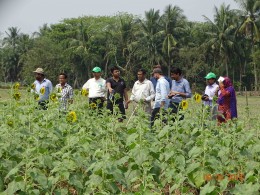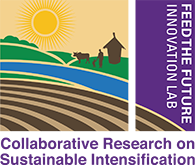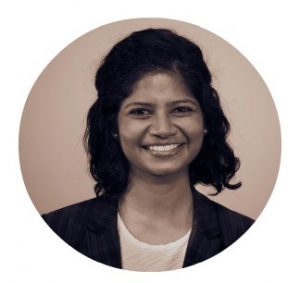 Maria Jones recently joined the USAID-funded Appropriate Scale Mechanization Consortium (ASMC) team from INGENEAES. The Feed the Future project Integrating Gender and Nutrition within Agricultural Extension Services (INGENAES) is also housed in the College of ACES within the AgReach program at the University of Illinois.
Maria Jones recently joined the USAID-funded Appropriate Scale Mechanization Consortium (ASMC) team from INGENEAES. The Feed the Future project Integrating Gender and Nutrition within Agricultural Extension Services (INGENAES) is also housed in the College of ACES within the AgReach program at the University of Illinois.
In June, Tim Rendall, ASMC project manager, and Jones traveled to Burkina Faso to meet with the in-country team and work with a team of faculty and students to conduct a gender analysis of the ASMC’s planter technology. In addition, Jones and Rendall trained in-country staff on gender integration, using a participatory training approach developed by INGENAES known as the Introductory Gender in Agricultural Activities training.
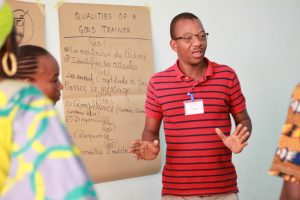
Using adult learning principles such as role-playing, small group drawing, and demonstrations, the one-day workshop helped faculty, students, and ASMC partners in Burkina Faso explore complex and deep-rooted practices, including roles and responsibilities of men and women in rural households, and who has “power” in local households and societies. The training also helped participants look at ways in which men and women participate in different agricultural value chains.
The technology assessment toolkit used by Jones in the five-day technology assessment workshop was designed by Cultural Practice LLC within the INGENAES project. While technologies can improve the timing of agricultural tasks and reduce drudgery, technologies are not inherently gender neutral Mechanization projects need to consider that if mechanized tools are introduced, cultural norms might dictate that men might be the ones who own or control their use. Jones explains that conducting a gender analysis acts as a first step to help researchers determine if a technology is working for its intended purpose to benefit both men and women farmers.
Jones and Rendall worked with a team of faculty and students from the ASMC Innovation Hub in Burkina Faso, and consortium members Dr. Tim Harrigan (Michigan State University) and Rob Burdick (Tillers International) to assess the planter technology using the technology assessment toolkit. Through interviews and observations, the team was able to determine that women do influence the technology adoption decision-making process, although they do not control the household’s decision-making regarding technology purchase.
Additionally, the team observed that women who are members of local agricultural producer associations or unions seem to enjoy increased influence over household decision-making in adopting new technologies. Men seemed to trust the information disseminated by the unions , and more readily adopted agricultural technologies promoted by the unions.
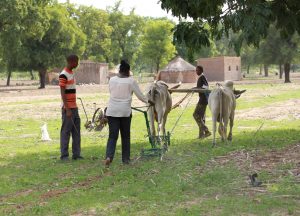
Jones said her biggest takeaway from the experience in Burkina Faso was for project leaders and researchers to keep the core purpose in mind when developing and refining technologies. Getting to the purpose requires solutions that are feasible and consider social and economic realities.
Over the last month, the ASMC Innovation Hub in Burkina Faso has been working to implement certain recommendations from the initial technology assessment conducted in June. For example, the hub is looking to test their planter technology with donkeys as draft animal power, as a feasible alternative to oxen, especially since female farmers do not tend to own oxen. The hub is also preparing to conduct a detailed gender study of the planter technology and its impacts on women farmers’ time and labor.
To read more about the technical aspects of the ASMC project, please read the Sustainable Intensification Innovation Lab (SIIL) blog post about the project, located here

